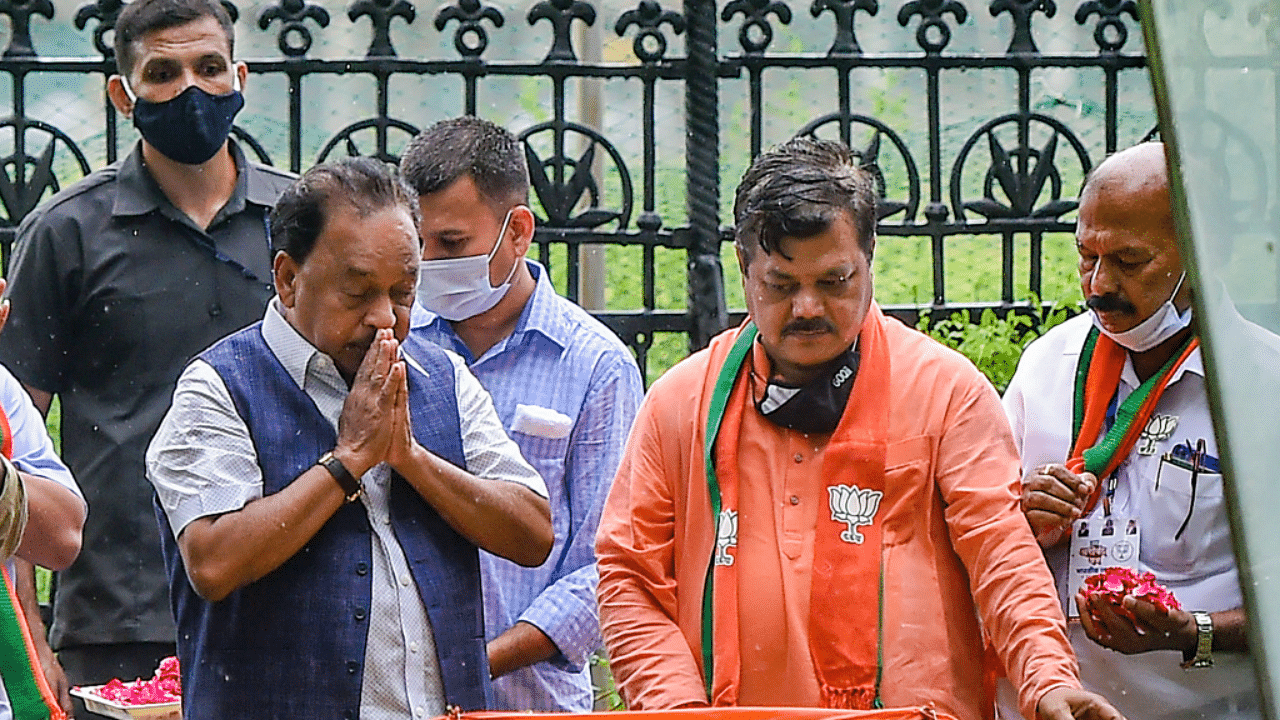
There's no getting away from caste.
Outraged at the sight of the Bharatiya Janata Party (BJP)'s Narayan Rane paying homage to the Bal Thackeray memorial last week, staunch Shiv Sainik Appa Patil found only one way of expressing his revulsion. He "purified" the memorial by pouring milk and sprinkling gau mutra (cow urine) on it.
Patil calls himself a proud third-generation Shiv Sainik. He considers Bal Thackeray his god, not an uncommon phenomenon in Maharashtra. He looks after the Sena chief's memorial and performs puja before it every morning. To have Narayan Rane, Thackeray's protégé-turned-traitor (he was expelled from the party in 2005), offer flowers to his god was an "impure" act Patil could not tolerate.
Patil is not the first Sainik to perform this ritual. Thirty-four years back, Chhagan Bhujbal (now in the Nationalist Congress Party) had poured Gangajal over the Martyrs' memorial from which Mumbai's landmark Hutatma Chowk gets its name. The previous day, thousands of Dalits had assembled there to protest against the Maharashtra government's decision to drop Dr B R Ambedkar's book, Riddles of Hinduism, from its compilation of Ambedkar's works after the Shiv Sena and the Maratha Mahasangh had objected to its inclusion. Obviously, for Bhujbal, the presence of the Ambedkarite hordes had defiled the monument that commemorates the 107 killed in police firing during the Samyukta Maharashtra movement, which resulted in the birth of the state in 1960.
Interestingly, neither of the two "purifications" fit into the traditional caste equation under which such rituals are carried out. Not one of the characters involved is Brahmins. Narayan Rane is a Maratha, considered "upper caste" (even though they clamour for OBC status today); Bhujbal belongs to the Mali OBC caste, "low" in the caste hierarchy but ranked "higher" than the Scheduled Castes.
Ironically, Bhujbal left the Sena in 1991 on the issue of caste. Thackeray refused to support reservations for OBCs introduced in 1990 by PM V P Singh through the Mandal Commission. Thereafter, whenever Bhujbal accused the Sena chief of being casteist, Thackeray would scornfully point to Bhujbal's "purification" of Hutatma Chowk after the Dalit rally. However, Thackeray didn't condemn Bhujbal's blatantly casteist act when it took place.
How could he? Thackeray was openly anti-Dalit, not against Scheduled Castes as such, but against those sections who'd rejected Hinduism and were aggressively demanding their rights, i.e., the Neo-Buddhist Ambedkarites. The Dalit Panthers' first clashes were with the Sena in 1974, and the Sena was the only party that opposed the demand to rename Marathwada University as Dr. Ambedkar University. Shiv Sainiks were involved in the violence against Dalits that marked the prolonged Namantar agitation for the university's renaming.
At the same time, the Sena was not, and is still not seen as an "upper caste" party, in the way the BJP was till recently. The OBCs supported the Sena. In Appa Patil's act, there is no element of caste animosity. Yet, it remains deeply casteist because the concept of purification is itself Brahmanical. The distinction between "pure" and "impure", the belief that the touch of certain persons defiles that which is touched, arises from a feeling of caste superiority. It is significant that neither CM Uddhav Thackeray nor anyone from the Congress and NCP, who share power with the Sena in Maharashtra, have condemned Appa Patil's "purification". All parties in the state swear by its anti-caste tradition and invoke the names of Jyotiba Phule and Ambedkar. It was left to the BJP's Devendra Fadnavis to recall Maharashtra's "progressive tradition" while condemning Patil's act. But being an RSS man, he termed it "Talibani".
Ironically, towards the end of the 2014 Assembly election campaign, when it seemed clear that Modi's appeal would sweep Maharashtra, an RSS veteran told me gleefully that with the BJP's ascent, Maharashtra's progressive tradition, which the Socialists were so proud of, would at long last be wiped out. (Maharashtra was a bastion of the Socialist Party, and Socialist stalwarts from SM Joshi to Mrinal Gore fiercely opposed the RSS.) Has his prophecy come true, or is the silence over Appa Patil's "purification" just "coalition dharma" again proving stronger than ideology?
However, what is even more disturbing is the way Dalits across the country are routinely performing similar acts of "purification".
In 2018 in Meerut and Hubballi (Hubli), Dalits poured milk and Gangajal on Ambedkar's statue after BJP leaders garlanded it. Last year, this was done by none else than the Communist Party of India (CPI) and Rashtriya Janata Dal (RJD) workers after local MP, Union minister Giriraj Singh garlanded Ambedkar's statue in Begusarai.
Truly, there's no escaping caste.
(The writer is a Mumbai-based journalist)